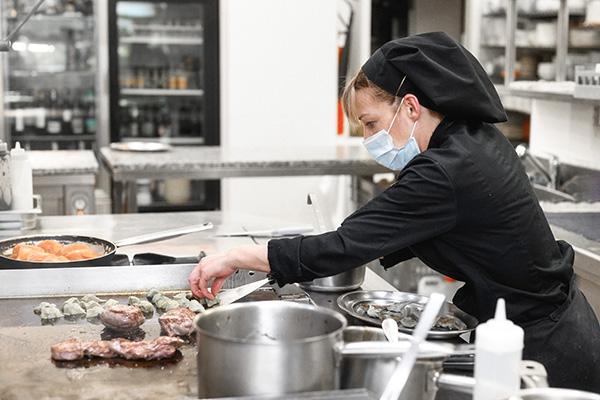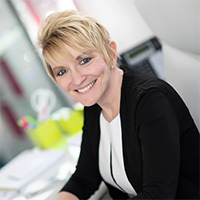The Many Benefits of HOCI for Preventing Food Safety Breaches

A major foodborne illness outbreak - salmonella-tainted cantaloupe - sickened and even killed consumers, resulting in a massive, multi-state recall in late November/early December 2023. This wasn't the first food safety breach involving produce this past year. Peaches, plums and nectarines sold at national retail locations in November were potentially contaminated with Listeria monocytogenes, which can cause serious, sometimes fatal infections, and had to be recalled.
Unfortunately, these weren't just isolated incidents. Many people remember Chipotle's multiple foodborne illness outbreaks, where customers' illnesses were traced back to Chipotle employees - in different locations - working while sick with norovirus, and spreading it to the food - and the guests.
As 48 million people get sick and 3,000 die from foodborne illness in the United States each year, the restaurant and foodservice industry must work together to prevent these food safety breaches from happening.
A better way to clean, disinfect, and sanitize foods and surfaces
Food safety breaches are 100% preventable, so why do they keep occurring and what can we, as an industry, do to stop it?
Increasingly, food businesses are turning to Hypochlorous acid (HOCl), which has become more widely known (and used) as a powerful, versatile, and effective disinfectant and sanitizer. HOCI is generated through electrolysis, where salt and water are combined, resulting in a solution that contains hypochlorous acid, a powerful sanitizing agent. Hypochlorous acid is naturally formed in various environments, including the human body, and plays a crucial role in disinfection and protection against pathogens.
HOCI has many significant benefits that make it ideal for restaurants and other foodservice businesses. For instance, it is:
- Effective. HOCI kills bacteria, viruses, fungi, and other pathogens, and is particularly effective against MRSA, COVID, Influenza, and Norovirus, as well as common foodborne pathogens like E. coli, Salmonella, and Listeria. If the salmonella-tainted cantaloupe - and the Listeria-contaminated stone fruits - had gone through a HOCI produce wash before being processed, it could have eliminated the pathogens and prevented the ensuing infections, recalls, and damaging, expensive fallout.
- Compliant. Importantly, HOCI is compliant with CDC, FDA, and EPA regulations, making it a gold standard disinfecting and sanitizing option for food businesses.
- Non-toxic, eco-friendly and 80-100x more potent than bleach. Pre-washing produce with HOCl gets rid of dirt, feces, and other contaminants that could sicken consumers. HOCl is non-toxic, sustainable, and safe to use on (and around) food. Unlike some other sanitizers that may leave harmful residues, HOCl breaks down into simple saltwater after use, posing no risk to consumers or the environment. Additionally, HOCl doesn't contain the harsh chemicals found in many traditional sanitizers, making it safer for workers handling it.
- Efficient. Since HOCl doesn't need to be rinsed off surfaces or food products, it saves time, effort, and water. This is a significant advantage in restaurant and food processing environments, where speed and efficiency are crucial.
- Odorless and tasteless. HOCl doesn't leave any odor or taste behind, which is essential for maintaining food quality and characteristics. In contrast, ozone can sometimes leave a distinct smell or taste, particularly in water. Since HOCl doesn't affect the taste and odor of treated products, it's the preferred choice for food processing applications and water treatment.
- Versatile. HOCl can be used in various applications in restaurants and other food businesses, including direct food contact applications, as well as surface and equipment disinfection. It can be used as a dip wash, spray, and fog, depending on the application. Food brands can quickly cover a large area using a ULV Fogger or electrostatic sprayer. Since HOCL is a very strong oxidant, the reaction time compared to bleach, lactic acid and peroxide-based sanitizers is much shorter, even at low concentration.
- Safe, easy to handle, with a long shelf life. When compared to other sanitizers and disinfectants, HOCI is often considered the preferred choice. HOCI has a longer shelf life than ozone, and is generally safer and easier to handle. HOCl can be applied in various ways - as a liquid, spray, or fog - and doesn't require specialized equipment like ozone does.
- Non-hazardous to human (and environmental) health. Ozone can be hazardous to human health if inhaled in significant quantities, while HOCl is non-toxic, eliminating the risks for respiratory issues. HOCl breaks down into harmless substances (mainly water and salt), whereas ozone can produce harmful by-products in certain conditions.
HOCl is, simply put, the best option for food businesses, including restaurants, grocery stores, and processing facilities, to disinfect and sanitize their food, equipment, and surfaces. HOCI the smarter way to boost food safety by disinfecting and sanitizing effectively, sustainably, and responsibly. In fact, HOCI is expected to gain a more significant following in the coming year. More restaurants and other foodservice brands should jump on this trend to keep their foods, guests, and businesses safer.
 Morten Larsen is CEO & Founder of EcoloxTech, which is leading the way in eco-friendly disinfection solutions, uniquely using Hypochlorous acid (HOCl), a naturally occurring, eco-friendly disinfectant that has gained recognition for its proven effectiveness in killing bacteria, viruses, and other pathogens, including MRSA, E. coli, COVID, Influenza, and Norovirus. EcoloxTech products are effective against 99.99% of all pathogens and 80-100 times more effective than bleach, yet are non-toxic, sustainable, and safe for humans, pets, and the environment. EcoloxTech products are being successfully used in hospitals, foodservice, cruise ships, and more. For more information, please visit https://ecoloxtech.com.
Morten Larsen is CEO & Founder of EcoloxTech, which is leading the way in eco-friendly disinfection solutions, uniquely using Hypochlorous acid (HOCl), a naturally occurring, eco-friendly disinfectant that has gained recognition for its proven effectiveness in killing bacteria, viruses, and other pathogens, including MRSA, E. coli, COVID, Influenza, and Norovirus. EcoloxTech products are effective against 99.99% of all pathogens and 80-100 times more effective than bleach, yet are non-toxic, sustainable, and safe for humans, pets, and the environment. EcoloxTech products are being successfully used in hospitals, foodservice, cruise ships, and more. For more information, please visit https://ecoloxtech.com.
 Francine L. Shaw is a food safety specialist, podcaster, founder of Savvy Food Safety, author of "Who Watches the Kitchen?", and a successful entrepreneur, and speaker who spent 30+ years working in the foodservice industry. Her career has included performing services (operating partner, corporate/private trainer, health inspector, third party inspector, adjunct professor) in various sectors of the foodservice industry. She has written hundreds of articles for national trade magazines and appeared on Dr. Oz, the BBC World Series Radio, and iHeart Radio as a food safety expert.
Francine L. Shaw is a food safety specialist, podcaster, founder of Savvy Food Safety, author of "Who Watches the Kitchen?", and a successful entrepreneur, and speaker who spent 30+ years working in the foodservice industry. Her career has included performing services (operating partner, corporate/private trainer, health inspector, third party inspector, adjunct professor) in various sectors of the foodservice industry. She has written hundreds of articles for national trade magazines and appeared on Dr. Oz, the BBC World Series Radio, and iHeart Radio as a food safety expert.


